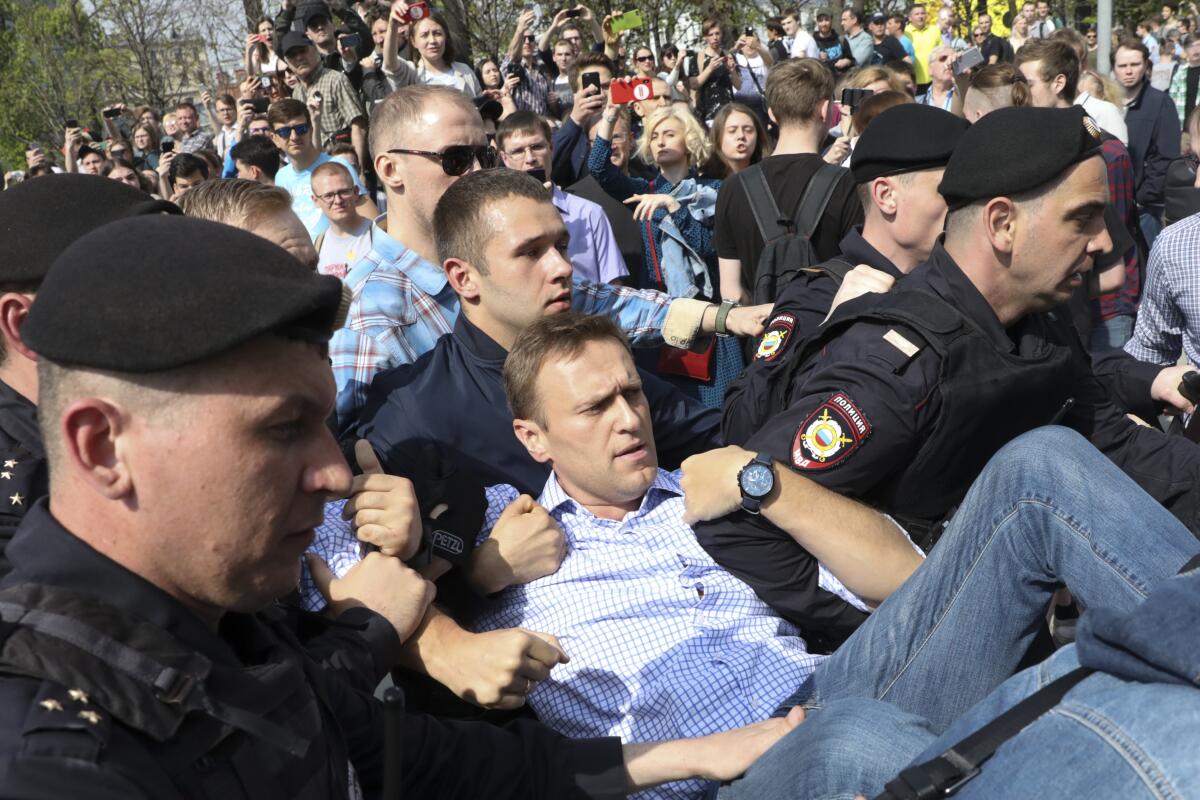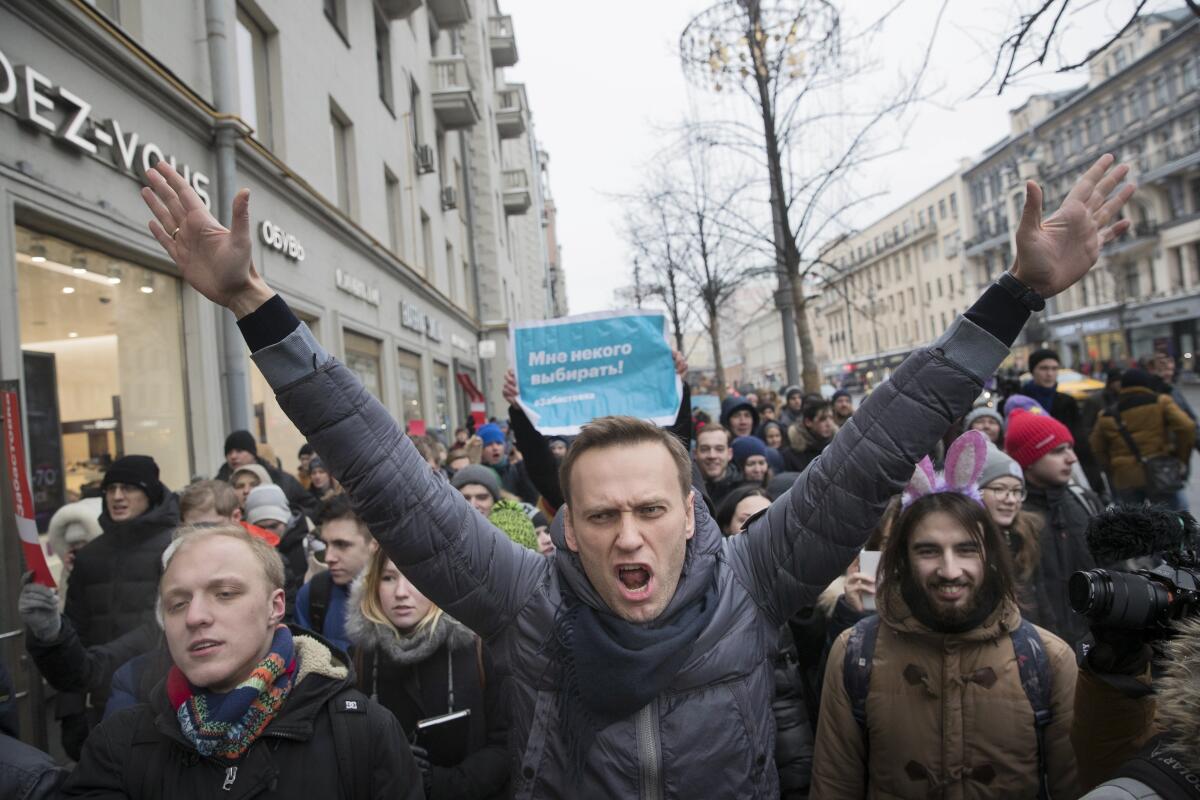MOSCOW — Russian opposition figure Alexei Navalny, who survived a near-fatal poisoning blamed on the Kremlin and endured harsh prison conditions even while wielding black humor and social-media savvy to battle President Vladimir Putin’s autocratic rule, died in prison Friday, Russia’s prison agency said. He was 47.
Even as he earned international accolades for scathing denunciations of Putin from behind bars over the catastrophic war in Ukraine and his fight for what he called a “beautiful” Russia free of dictatorial rule, Navalny’s health visibly deteriorated after his imprisonment in early 2021 in a notorious penal colony east of Moscow.
His emaciated appearance shocked supporters when he appeared, via a blurry video link, at an Aug. 4 hearing at which he was sentenced to 19 years of incarceration on what his supporters said were trumped-up charges of extremism. He had already been serving a nine-year sentence imposed after returning to Russia — and certain arrest — following his recovery in Germany from the 2020 attempt to kill him with a military-grade nerve agent.
Russian opposition leader Alexei Navalny signals to supporters from the defendant’s cage during a 2021 hearing in Moscow.
(Moscow City Court via AP)
The United States, together with other Western governments and human rights groups, called his latest trial and conviction a sham, demanding Navalny’s immediate release. Secretary of State Antony J. Blinken called the sentencing “politically motivated,” adding: “The Kremlin cannot silence the truth.”
Critics blasted the shadowy nature of the trial, held in a makeshift courtroom without family members, journalists or spectators present. In video footage, Navalny — clad in a black prison uniform — appeared even more frail than in other recent appearances, with hair cropped close and eyes blazing out of a gaunt face.
Over the years, from inside and outside prison, Navalny got under Putin’s skin as few other critics managed to do, daring to level taunts at the Russian leader alleging graft in his inner circle that were more direct and pointed than any opposition figure before him. Putin, for his part, for years refused to utter the name of his nemesis in public.
Following his latest trial, Navalny commented in a social media post, presumably relayed through his team, urging his supporters “not to lose the will to resist.” Of his sentence, he said, the numbers hardly matter — but portrayed his plight as an implicit struggle to the death between himself and Putin’s rule.
“I understand perfectly that, as many political prisoners, I’m serving a life sentence, which is measured by the length of my life or the length of life of this regime,” Navalny said.
The war in Ukraine — a full-scale invasion launched by Putin in February 2022, intended to swiftly subdue Russia’s smaller neighbor — turbocharged the Kremlin’s crackdown on any form of domestic dissent. Independent Russian media outlets were shuttered and criticism of the country’s military was designated a criminal offense. Navalny’s team, together with many other opposition figures, was forced into exile.
Navalny, who until then had concentrated his messaging on corruption in Putin’s inner circle, tailored his jailhouse missives to jab repeatedly at a war effort he called both unjust and almost comically incompetent, with ordinary conscripts and their families paying the price of the Russian leader’s grandiose ambitions.
“It’s one thing if Putin killed Ukrainian civilians and destroyed life-critical infrastructure with full approval from the Russian citizens,” he wrote in a social media post a month after the war began. “However, it’s a whole different story if Putin’s bloody venture is not supported by the society.”
Ukrainians, however, largely refrained from joining in worldwide lionization of Navalny, with many remembering his tacit initial support of the Russian leader’s illegal seizure and annexation of Ukraine’s Crimean Peninsula in 2014. That year, the same one in which Ukranians ousted a pro-Kremlin leader in a popular uprising, Russia also fomented a separatist uprising in Ukraine’s industrial east, which Ukraine considers the true beginning of the current war.
From Navalny’s early days as a blogger, he rose from being a relatively little-known gadfly — a lawyer who doggedly documented corruption in high places — to the country’s best-known opposition figure. In 2023, a film about his activism and recovery from poisoning won an Academy Award for best documentary feature. He was taking part in a video-link court hearing from prison when he learned of the Oscar.

Russian police carrying struggling opposition leader Alexei Navalny, center, at a demonstration against President Vladimir Putin in Pushkin Square in Moscow, Russia, Saturday, May 5, 2018. Thousands of demonstrators denouncing Putin’s upcoming inauguration into a fourth term gathered Saturday in the capital’s Pushkin Square. (AP Photo)
(AP)
After his January 2021 arrest, protests — the largest in Russia in at least a decade — spanned all of the country’s 11 time zones and triggered thousands of arrests.
After Navalny began a hunger strike in late March 2021 to protest Russian authorities’ denial of proper medical treatment — for ailments likely linked to his poisoning with what Western doctors said was the nerve agent Novichok, — his plight prompted anguish and fury from supporters at home and around the world.
An Instagram post by Navalny about his hunger strike ordeal employed the biting tone to which his followers were accustomed, describing how a prison official “detailed the joys of force-feeding to me.”
His 2021 imprisonment was purportedly for a parole violation — a Kafkaesque charge, his supporters said, because he was hospitalized in Germany at the time he was accused of failing to check in with parole officials — stemming from what the European Union describes as a politically motivated fraud conviction in 2014.
Behind bars, he developed severe back pain and numbness in his legs, possible side effects of his poisoning. Russian authorities responded to his requests for proper medical care by sending in what Navalny called a propagandist — Maria Butina, who served jail time in the United States for working as a foreign agent before being sent back home to Russia — along with a television crew, to mock his claims of ill treatment.
Even as he languished, Navalny’s backers kept up a drumbeat of claims over high-level corruption. In April 2021, his organization — which had released a widely viewed video called “Putin’s Palace,” about an opulent Black Sea compound purportedly paid for by the president’s wealthy supporters — put out a new investigation of a luxurious residence said to have been used by Putin on a lake northwest of the Russian capital.

Alexei Navalny, center, attends a rally in Moscow in 2018.
(Evgeny Feldman / Associated Press)
His fifth and last criminal conviction had to do with the work of his foundation, which Russia outlawed in 2021, along with Navalny’s other offices, as extremist groups. The extremism charges criminalized all the anti-corruption foundation’s activities since its 2011 founding, Navalny’s allies said.
The court ordered Navalny to serve the new term in a “special regime” penal colony, where men given life sentences or “especially dangerous recidivists” are sent.
He was already being held in a maximum-security prison — Penal Colony No. 6 in the town of Melekhovo — and had spent months in a tiny, one-person “punishment cell.” His alleged infractions included not washing his face at a specified time and not buttoning his clothing properly.
After his August sentencing, Navalny spokeswoman Kira Yarmysh told the Associated Press that the opposition leader still felt optimistic.
“It seems to me that he is probably the biggest optimist among all of us,” she said. “This happens because Alexei is absolutely convinced in what he’s doing and confident that he is right.”
Former special correspondent Vasiliy Kolotilov and the Associated Press contributed to this report.


